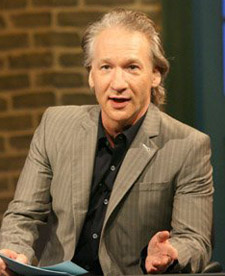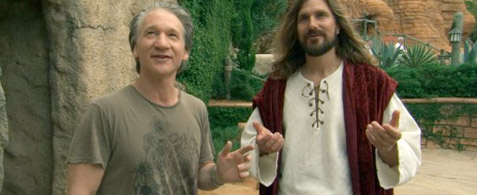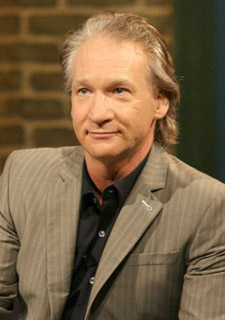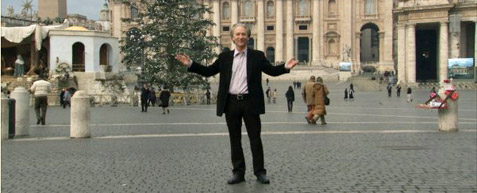
Interview date: 02/09/2009
Run date: 02/18/2009
Movies Home / Entertainment Channel / Bullz-Eye Home
Bill Maher took the time to speak with a group of writers, including Bullz-Eye, in connection with the DVD release of his film, “Religulous.” The conversation was typical Bill Maher: irreverent and hilarious, sparing no one. Bill knows how to have fun with the topic of religion, but he’s deadly serious about is as well. He noted right away how Barack Obama acknowledged nonbelievers in his Inaugural Address, and he also discussed how making a film was hard, and that he’ll never do it again. If you’re sensitive about this topic, proceed with caution, but if you have a sense of humor about it, enjoy the discussion!
Sean McCarthy (Comic Comics Online): Hey, Bill, thanks for your time.
Bill Maher: Hey, Sean.
SM: I’ll start with something timely. Since Barack Obama is giving a speech tonight on national television, one of the few things that kind of tripped him up during his campaign was his various religious affiliations. Do you have any advice for the new president?
BM: You mean Reverend Wright?
SM: Reverend Wright, and then his selection for speaker at the inauguration.
BM: Right, you mean Rick Warren. Well, I think so many times you see Reverend Wright, Pat Robertson, Jerry Falwell…these are the people who get you in trouble, and they always seem to have “Reverend” in front of their name. Maybe that should be a hint. But, look, Barack Obama is President of the United States; he’s a politician in America, a very religious country, so I understand why he has to pretend to be a religious person himself. I say “pretend” because I can only hope that someone as bright as he doesn’t really believe that people can walk on water and ride a winged horse and that it rained frogs and that you can change water into wine. I can only hope, but I don’t know. I did think it was pretty interesting that, in his inauguration, for the first time ever, he gave a shout-out to nonbelievers. I mean, it was only two words, but it was a revolutionary two words. I’m surprised more people didn’t take note of it, but he did say in the inauguration speech something about Christians and Jews and Hindus and nonbelievers. I almost fell off my chair. I was like, “Yes, thank you!” So there we go: progress. Baby steps, brother, baby steps.
Emma (Punchline Magazine Online): Hi, Bill. How are you today?
BM: Hey, how are you doing?
Emma: Good. Some of my favorite parts of “Religulous” were the biographical elements in which you and director Larry Charles explored your personal background with both religion and non-religious identity. I was wondering: do you feel that the process of filming was cathartic as a learning experience for you in that way?
BM: Well, no, if I understand your question correctly. It certainly was cathartic to get this subject out of my system. I felt after I made this movie, quite frankly, like if I had to retire from working, from show business, I could do it now. This was my Moby Dick, and I felt like I harpooned that motherfucker, and that was tremendously cathartic. But if you’re asking if there was some spiritual revelation that I had making the movie, no. I mean, I came to the movie at the age of 51, so I had already had my evolution. And you’re correct, we tried to show in the movie…we felt it was very important to show that it was an evolution that brought me to the thinking I have now. That I just didn’t overnight someday go, “Oh, this is all a crock, and now I’m an atheist.” No, I was brought up Catholic. We explore that; we show my mother, my sister. And then I take great pains to explain on camera that there was years and years after that when I wasn’t really religious; I certainly wasn’t a Catholic anymore, but I still lived with some mythical man in my head. I didn’t really put a name to a face, but I just knew when I was in trouble or scared, I’d be, like, “Oh, God, please get me out of this one.” I only really talked to him when I was in some sort of trouble or some sort of bargaining mode. And it really wasn’t until I was over 40 that I went, “Oh, come on, stop bargaining, stop pretending there’s some man who lives in your head, and just suck it up and say you’re here alone on this earth.” You enter alone, you’re going to leave alone, and nobody knows what happens when it’s over. But it’s probably like the ending of “The Sopranos,” it just goes to black.
Chris (IGN): Yeah, hi, Bill. How are you doing?
BM: Hey.
Chris: I guess my question…you just touched on it a little bit, but you say in the movie that the idea of religion is like sort of selling an invisible product, in that the product is simply something you don’t know. Is there an argument out there or is there some part of you that acknowledges and embraces the positive thing, the possibility that there could be at least some foundation for sort of religious truth? If only because, throughout so much of the movie, you’re sort of playing the devil’s advocate, no pun intended…
BM: Well, how would you define…you invoke the phrase ‘religious truth,’ which I think is an oxymoron. How would you define ‘religious truth’? And then I can answer that.
Chris: I guess my question would be, is there any part of you that is…that has any faith or believes that there is a legitimate argument for the existence of…certainly not the Catholic God, but a god?
 BM: Well, certainly not a personal God. I mean, if you read the Old Testament, it’s really one of the wickedest books you’ll ever come across. I mean, God is an insecure, rage-filled hybrid of Bobby Knight and Suge Knight. You know, he’s got these anger issues that you can’t believe. He’s like John McCain if McCain could fart hail. He’s pro-slavery, he’s pro-polygamy, he’s homophobic, he’ll kill you for masturbating. More people get stoned in that book than in my house. So if this is what you call religious truth, no. I think I could say definitively I don’t think that that’s at all possible. But, I mean, what is possible? What is the answer? I don’t know. Yes, it could be anything. It could be Jesus and it could be Ferbi or it could be the lint that lives in my navel, but it’s probably not. Whatever it is, I doubt we as humans on Earth could have any perception of it while we’re here. So why give yourself a headache thinking about it?
BM: Well, certainly not a personal God. I mean, if you read the Old Testament, it’s really one of the wickedest books you’ll ever come across. I mean, God is an insecure, rage-filled hybrid of Bobby Knight and Suge Knight. You know, he’s got these anger issues that you can’t believe. He’s like John McCain if McCain could fart hail. He’s pro-slavery, he’s pro-polygamy, he’s homophobic, he’ll kill you for masturbating. More people get stoned in that book than in my house. So if this is what you call religious truth, no. I think I could say definitively I don’t think that that’s at all possible. But, I mean, what is possible? What is the answer? I don’t know. Yes, it could be anything. It could be Jesus and it could be Ferbi or it could be the lint that lives in my navel, but it’s probably not. Whatever it is, I doubt we as humans on Earth could have any perception of it while we’re here. So why give yourself a headache thinking about it?
Chris: Right.
BM: Just be a good person. That’s what an ethicist, is and there is evidence that ethical people…ethicists, rather, people who are not religious but simply live by ethics, are more ethical because they don’t have that fall back position of, “Yeah, I fucked up and I sinned, but you know what? I went to confession every Sunday and I got rid of the sins. And on my deathbed, I said, ‘I love Jesus, so he came in and saved me at the last second.’” You know, there’s an awful lot of leeway to act like a complete shmuck when you’re a religious person, because it’s not really about how you act, it’s really about how much you love Jesus and how much you believe in him and how much faith you can have. You can…they will tell you right to your face, you can live a horrible life and on your deathbed go, ‘Okay, Jesus, I believe in you now,’ and it’s all cool; it’s all forgiven. So it’s just silly. Come on.
Troy (Deadbolt.com): Hey, Bill.
BM: Hey.
Troy: Hey, I guess that it’s a miracle that I’m talking to you today.
BM: (laughing) I get it.
Troy: I noticed there seems to be some similarity between how zealous people are about the Obama movement and how crazy people get about religion. Do you see the same thing?
BM: You mean that they are positioning Obama as some sort of chocolate Jesus who is infallible?
Troy: Savior, yeah.
BM: Well, that’s ridiculous. That’s not Obama, that’s Kanye West. (laughs) No, I’m kidding. Well, there always is the tendency in human nature to deify. I don’t understand it because I don’t do it myself, but I was talking to somebody the other day and they were telling me about this yoga class. I said, “Who goes?” And they said, “Very cool, hip people; you would like them. They were talking about your movie; they loved your movie.” And they said, “But it’s ironic, because a number of them have already sort of made the yoga teacher into a god. You know, he’s up at the front of the room and he’s teaching them, and they talk about him after the session like he’s some sort of other worldly being.” And I was just laughing, because it just seems to be human nature to want to posit in another human being qualities that you must know in part of your mind that a human being couldn’t possess because you don’t possess them. This is what I try to say in the movie; do I know what the answers is? No, but you don’t, either. These people who talk about the next world in such detail…I mean, listen to Rick Warren, “Oh, when you get to heaven, you’ll meet Jesus; he’s sitting at the right hand of the Father, not the left, the right. And he’s wearing a gold robe and it has piping on the sleeve. And there are twelve angels there, and three of them are playing trumpets.” How the fuck do you know this? Are you kidding me? You don’t know. How do I know you don’t know? Because I don’t know, and you do not possess mental powers that I do not. There you go…I don’t know what the question was, but…
Troy: That was perfect.
BM: Okay.
Bullz-Eye: Hey, Bill.
BM: Hey.
BE: Hey, you had a great routine a couple of years ago where you were comparing our religious nuts in this country to some of the more radical Muslims who wanted to kill Americans.
BM: Yes, I remember.
BE: You made it clear that one was definitely crazier than the other, that you couldn’t compare them. So I was wondering in putting this movie together if you came to any ranking of the five craziest that were out there.
BM: Like craziest religions?
BE: Yeah. Is there a scale, or are they all in the same boat?
BM: As far as crazy goes, I think they are all in the same boat. I think they all believe in crazy shit. Like I said a minute ago, we were talking about the Old Testament. I mean, when you read the Old Testament and you read that God, the Jewish God, the old man God, he is just a vicious, horrible character. He just wipes people out endlessly for no apparent reason. And that’s the Jews who are among the big three in the West who are among the more peaceful religion; but they are also crazy. And then, of course, when you get to people like the Mormons and the Scientologists, who I think should combine and make a Mormontologist, because what they believe is just so out there that it’s laughable. But I think it only strikes us as laughable because it’s newer. You know, the idea that Jesus partied with the Indians in the new world, in 400 AD, as the Mormons believed; or that when you die, you and your wife will rule over a new planet in the universe, or that you can baptize the dead. I mean, some of this stuff is just so outrageous, but all religion is. Because, again, it is just people selling an invisible product. It’s just people making shit up out of old cloth. “Oh, I found the Book of Mormon in a field, and here’s what it says,” and then other people believe it. It’s just astounding that people will just follow anything. The difference that I think matters is which of the religions are dangerous. They’re all crazy, but which ones have the potential to turn that into death? And in that area, I think we have to worry mostly about the Muslims and the Christians. The routine that you were citing was saying that our civilization is more advanced…yes, I believe more advanced…than the Islamic civilization is because it’s 600 years older, and in that 600 years, we have learned the most fundamental thing about religion, which is to ignore it. You see, the difference is when we talk about homosexuality, when Pat Robertson or Jerry Falwell talks about homosexuality, they absolutely condemned it, but they didn’t take the bible so literally that they actually stoned homosexuals to death. But that’s what they do in Saudi Arabia; they’ll actually cut your fucking head off if you’re gay. You know, the key to me in religion is to just treat it like it doesn’t really matter, and that’s what we do. We have a pope, but we don’t really believe him; we don’t really listen to what he says; we don’t really take it seriously. That’s what has to happen with religion; it has to be marginalized. In the Islamic world, it’s not marginalized, it’s taken literally.

Brian (Movieweb.com) Hey Bill, how are you doing today?
BM: Hey.
Brian: I was just wondering after the movie has been shown and everything, have you gotten a response from most believers and nonbelievers that you kind of hoped for? And have heard of anyone actually taking a step back from their religious views after watching it?
BM: Yes, on both occasions. You know, the people at the movie company suggested about a month before the movie opened that I should get on MySpace as way to promote the movie. They said, “This is a great tool,” and I was, like, “Oh, come on, I don’t want to be on MySpace.” Okay, so I got on MySpace, because I wanted to promote the movie. I really was so busy promoting it and trying to do “Real Time” at the same time that I didn’t read many of the messages. But then after the season ended in the middle of November, I went back and read these thousands of messages, or as many of them as I could. And I was amazed that not one person who saw this movie who didn’t send the most positive message. I mean, there was literally no negative messages…except, of course, for a few people who were, “I’m going to kill you, you’re going to burn in hell.” But mostly the religious people didn’t see the movie, I could tell. Very few of the religious people even dared to enter that theater because, of course, their world is about certainty and they do not want something that is upsetting that apple cart. But the people who saw it, the response was overwhelmingly positive, and it made me happy that I got on to MySpace.
Jason (the213.net): Hey, nice to talk to you, Bill.
BM: Thank you.
Jason: You know what I was curious about? I was watching the special features, and I remember the scene where you went into the clothing store and you were talking to a guy. I just remember the look on his face was like grim death; it scared me.
BM: The Burka store?
Jason: Yeah.
BM: The Burka store in London.
Jason: Was there ever a time during shooting that you were ever…in talking to the various religious figures, was there ever a time that you felt, like, nervous or unsafe or anything like that?
BM: Oh, constantly. There’s also a scene where we’re talking to those truckers at that little trailer that was the Truck Stop Chapel, and there’s that big, big guy who balls up his fists and goes, “If you start questioning my God, then you’re going to have a problem with me.” And I was at the other end of the trailer, and it was a very tiny room, and I thought, “Oh, there’s no way I can get out of here. This guy is going to come here and pummel me and that’s going to be the end of this movie.” But, luckily, he walked out. He turned the other cheek…and it was a sizable cheek. But, yes, you know, we were in the position of confronting people about their most cherished beliefs; there’s going to be a few hard feelings. But in general, I think we did it in a way that we tried to be positive and sort of laughing and happy and not poking fingers at people and belittling them. As I’ve always said from the beginning, I don’t have to make fun of religion, it makes fun of itself.
Cheryl (Video Business): Hi, Bill.
BM: Hi.
Cheryl: With such a controversial and provocative topic, what were some of the biggest challenges in making the film, either personal or technical?
 BM: Well, for me, the entire idea of making a movie is a challenge. For those people who have said to me, “Oh, is this a new career for you? Are you going to do more documentaries?” No! I had one topic that I thought was the ultimate taboo that I wanted to get out of my system. I think I made my point, and I have no desire to ever do another movie. Because to answer your question, I’m just not a person who enjoys long travel situations, and we were on the road for two and a half months; in foreign countries, staying in crappy hotels. I’m not a person who has ever gotten up early in the morning with a lot of cheer on my face. You know, I’ve been able to have a very comfortable life doing a television show over the last sixteen years where I didn’t have to get up early in the morning and have makeup on my face all day and eat crummy food and the rest of it. So to me, that was the big challenge; to actually put myself in that uncomfortable situation of being on the road with a movie crew.
BM: Well, for me, the entire idea of making a movie is a challenge. For those people who have said to me, “Oh, is this a new career for you? Are you going to do more documentaries?” No! I had one topic that I thought was the ultimate taboo that I wanted to get out of my system. I think I made my point, and I have no desire to ever do another movie. Because to answer your question, I’m just not a person who enjoys long travel situations, and we were on the road for two and a half months; in foreign countries, staying in crappy hotels. I’m not a person who has ever gotten up early in the morning with a lot of cheer on my face. You know, I’ve been able to have a very comfortable life doing a television show over the last sixteen years where I didn’t have to get up early in the morning and have makeup on my face all day and eat crummy food and the rest of it. So to me, that was the big challenge; to actually put myself in that uncomfortable situation of being on the road with a movie crew.
Sean: Since we’re talking about the DVD release, a lot of times when people put out the special features and deleted scenes, it’s things you really hoped to get in the movie but didn’t for some reason or another. And then there’s other scenes where you look at and go, “That really shouldn’t have been in the movie in the first place.” Where did you fall when you looked at these scenes?
BM: No, I thought we made the right decision about what we included in the movie. You know, it’s always a difficult process to edit a movie because you are, of course, killing your children. But as anyone in any art, not just movies, will tell you, editing is really the key to success; it’s being ruthless with your own product. So when I looked at some of the extras, I thought, “Yeah, that’s a wonderful point,” or, “That was such a funny moment,” or, “God, I wish we could have put that in there.” But if something is redundant or something doesn’t move the story along; if something just doesn’t feel right, you can’t have sort of a sentimental attachment to it. So that’s the wonderful thing about a DVD, is that you kind of get the best of both worlds. You get the real product, and then you get everything else that might have gone in and is supplemental to it. But I really do think we made the right moves with what we put in there, because I watched it with an audience as it was being shaped, and in a sense, the audience is the director, as it should be.
Emma (Punchline Magazine): Okay, I’m going to inject a little bit of silliness into our theological discussion here.
BM: Oh, good.
Emma: So if you could smoke a bowl with any major religious figure throughout history, who would it be and why?
BM: Throughout history?
Emma: Mm-hmm.
BM: I mean, the obvious answer would be God, or Jesus, who is God’s son. Or Mohammad; boy, I’d love to get him stoned. I guess I would have to say Jesus because I’m more familiar with him; I grew up with him. I mean, they stuffed him into my head when I was a child. I’d love to get at that whole thing about, “Wait a second, you’re the son of God, but you’re also God. God is your dad, but you’re also him.” I mean, that to me is a discussion that really merits being talked about over a bowl.
Emma: Thank you.

Chris (IGN): Yeah, was there…if we could all just sort of stipulate or agree upon that faith to a certain degree lies in the face of sort of logic and rationality, was there anybody you met on your trip where you kind of said to yourself, “Even though we might disagree, this person sort of looks at religion in a very sort of level headed way,” or a way that you could sort of respond to or gel with?
BM: Oh, absolutely. The two Catholic priests that we talked to…there was a lot of reaction to those men, because I think people were shocked, as we were, that they were talking so rationally about the religion. We talked to one gentleman whose name was Father Foster; he’s the bald man, we talked to him right outside the Vatican. He was the one I was asking him questions like, “Does it strike you as odd the person, this homeless man who started this religion and preached about the poor, would then bequeath it to this prince of the church who lives in a giant palace?” And he didn’t argue with it, he said, “Of course. If it was up to me, Christ would be living in a barracks outside of the city.” And he was saying, “Of course, these are just stories that we tell the common people.” I mean, he was saying things that…I hope he’s still working there, because I would be surprised if he didn’t lose his job over that! And then we talked to another Vatican scholar, I can refer to him as because he was, Father Coin, who was talking about science in a way that was much more rational than you get from the rank and file. And I guess what it taught us was that the hierarchy of the church…they don’t really believe this shit. They know that the masses need it, but they themselves don’t really buy it. Which on one level is just such a tremendous hypocrisy, and I guess they justify it by telling themselves that, “Well, we’re brighter than these people and we have to feed them these scraps of nonsense to keep them in line, but we ourselves are not on board with this.” It was an astounding revelation.
Troy: How well do you think the movie and the questions will hold up thirty years from now when people re-watch it?
BM: Well, unfortunately, I think they will hold up, because, unfortunately, I don’t think we will have killed off religion. I mean, these are eternal questions. Why is faith good? I don’t think that question is going to go away. Would it be wonderful if this movie was completely dated in thirty years because everyone had become a rationalist in this country? That would be magnificent. But I just don’t think that’s going to happen in my lifetime.
You can follow us on Twitter and Facebook for content updates. Also, sign up for our email list for weekly updates and check us out on Google+ as well.











